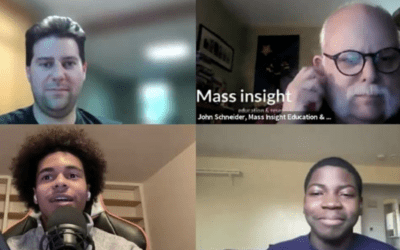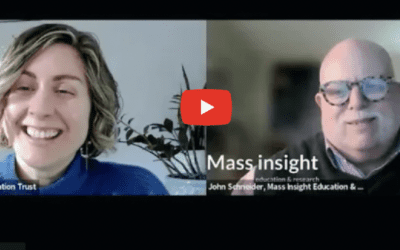In this op-ed for Globe Rhode Island, Mass Insight's Susan Lusi writes that education in Providence is in crisis and asks Rhode Islanders to support a special commission’s recommendations to move the city's schools forward. Read the full op-ed from The Boston Globe...
Creating the conditions for greater success of systemically disadvantaged students in AP: Next steps for the Massachusetts AP STEM & English program
Recently the New York Times published an article entitled, Why is the College Board Pushing to Expand Advanced Placement? The article focuses on an important issue: there’s been greater growth in AP participation for Black and Latino students and students living in poverty than there has been growth in qualifying scores. This matters because qualifying scores are a measure of attainment, and they also may earn a student college credit.
I spoke with the reporter regarding the importance of this issue, the systemic inequities leading to this result, and the next steps we at Mi think are needed to make greater progress in qualifying scores. I wish she had spent more time discussing how the disparity in qualifying scores might be addressed going forward, particularly since the two of us talked about it.
Mi has managed the Massachusetts AP STEM & English program since 2008. Launched as a private initiative targeted at increasing both participation and success in AP for Black and Latino students, and students living in poverty, the program has been a public-private partnership with the state of Massachusetts since 2014.
We serve schools with greater-than-average percentages of students of color and students living in poverty. Last school year, the average Mi partner school was 13.73% Black, 31.67% Latino, and 55.56% students living with low-income compared to a statewide average of 9.4% Black, 24.2% Latino, and 42.3% living with low-income. In SY21-22, students from Mi schools comprised 20% of all STEM and English test takers in the state, but 40% or more of Black, Latino, and low-income test takers.
We are proud of the work we have done to bring challenging academic coursework, in the form of AP, to countless more students of color and students living in poverty and believe that all students should have the opportunity to engage in college-level work while in high school. Since school year 2008, the number of students taking AP exams in the STEM and English fields across Massachusetts has increased by 115%, the number of Black students taking these tests has grown by 242%, and the number of Latino students by 530%. Our partnership deserves substantial credit for this growth and particularly so for systemically disadvantaged students.
Despite this important progress, we too have observed that fewer systemically disadvantaged students receive qualifying scores. For example, Black students took 12% of tests taken in our partner schools, but received 7% of the qualifying scores, and the comparable numbers for Latino students were 18% and 10%.
Parts of the Times article could be read to blame the test for poor student performance. We should continue looking to improve how we assess what students know, considering for example, the impact of testing time limits, adding more project-based components to assessments (as College Board and others are working on), and working to address testing bias and increase cultural relevance. This said, poor test performance is often due to gaps in academic preparation stemming from the inequitable distribution of high-quality academic experiences and other supports students need to thrive. We must address these root causes, not just eliminate assessments and pretend these inequities don’t exist.
Our current AP STEM & English Program is a “fourth quarter” strategy, implemented solely in AP courses, which students generally take during their final two years of high school. But widespread opportunity gaps mean that too many Black, Latino, and students living with low income enter AP classes without the academic preparation needed to succeed. This is particularly problematic given extensive research findings that earning a qualifying AP exam score is much more closely related to college outcomes than AP course-taking alone.
Students can’t make up years of academic disinvestment by taking one AP course. We believe that the next generation of the AP STEM & English program in Massachusetts should continue to provide world class professional development for teachers, and additional learning time and exam fee subsidies for students in all schools we serve, while adding capacity-building supports in our highest need schools to redesign systems and structures so that all students enter advanced course work with the academic skills to succeed.
Mass Insight has a successful track record of providing capacity-building supports to schools around the country that is as long and impactful as our work in AP. Helping students that have been systemically disadvantaged achieve greater success in advanced coursework will require bringing both sets of our strengths to bear.

Recent Posts
An Interview with Mass Insight AP Students and their Teacher
https://youtu.be/mQTeW8-sX40 We sat down with two Mass Insight AP STEM & English Program students, Ben and Chris-Ander, and their teacher, William Pellegrino, to hear about their educational journeys, their experiences in AP classes and as vocational students, and...
Mass Insight Education & Research names Andrea Wolfe President & CEO
Ms. Wolfe succeeds Dr. Susan Lusi, who will step down in June after leading the national nonprofit for eight years. April 18, 2024 – The Board of Directors of Mass Insight Education & Research has named Andrea Wolfe as the next President & CEO of the...
You may also like
An Interview with Mass Insight AP Students and their Teacher
https://youtu.be/mQTeW8-sX40 We sat down with two Mass Insight AP STEM & English Program students, Ben and Chris-Ander, and their teacher, William Pellegrino, to hear about their educational journeys, their experiences in AP classes and as vocational students, and...
An Interview with Kristen Hengtgen of The Education Trust
https://youtu.be/1ZfxNShHJOU?si=d1a1GoVrgrDWT5Cu Kristen Hengtgen, Ph.D. is a senior analyst on The Education Trust's P-12 policy team and co-author of their new report, Increasing Access to Advanced Coursework in Massachusetts. In this interview, she joins Mass...
Recentering Our Communities in School Transformation: An Equity-First Approach
This is the final post in Mi’s Revisiting the Turnaround Challenge blog series. In Revisiting the Turnaround Challenge, we examined the outcomes of three “turnaround zones” implemented by urban public school districts in partnership with Mi between 2012-2019. Our goal...


